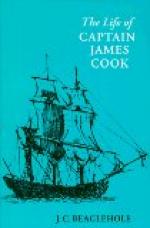Touching at St. Helena, where Kendal’s watch was found to differ by about two miles from the observations of Mason and Dixon at the Cape and those of Maskelyne at St. Helena, he proceeded to Ascension, where he obtained a good supply of fresh turtle, and then to Fernando de Noronho, fixing the position as 3 degrees 50 minutes South, 32 degrees 34 minutes West, and crossed the line on 11th June. Calling in at the Azores, land was sighted near Plymouth on the 29th, and next day they anchored at Spithead; and Cook, Wales, Hodges, and the two Forsters immediately started for London, having been away from England three years and eighteen days. During this time they had lost four men, three from accident and one from disease—a record unprecedented in the annals of British Naval history.
The war with the American colonies was naturally occupying the attention of the public, but the newspapers found space to publish more or less authentic information as to their arrival and proceedings on the voyage. One paper gravely said that:
“Captain Cooke will be appointed Admiral of the Blue, and command a fleet which is preparing to go out in the spring, as a reward for the discoveries he has made in his last voyage in the South Seas.”
On 9th August Cook was summoned to St. James’s Palace and had a long audience with the King, presenting several charts and maps and submitting several drawings, some of which were ordered to be engraved for the private museum. In return the King presented him with his commission as Post-Captain and his appointment to H.M.S. Kent. The commission, signed by Sandwich, Penton, and Pallisser, bears date 9th August. Furneaux was made Captain. He sailed for America in October, and was present at the attack on New Orleans in 1777; he died at the age of forty-six, some four years later. Kempe, Cooper, and Clerke were promoted to Commanders; and Isaac Smith, Lieutenant. Mr. Wales was appointed Mathematical Master at Christ’s Hospital, and Charles Lamb mentions him as having been a severe man but:
“a perpetual fund of humour, a constant glee about him, heightened by an inveterate provincialism of North Country dialect, absolutely took away the sting from his severities.”
Mr. Forster was received by the King at Kew, and was afterwards presented to the Queen, to whom he gave some of the birds bought at the Cape. He also attracted attention from another quarter, for Lloyd’s Evening Post reports that on 6th August, his house at Paddington “was broke open and robbed of effects of considerable value.” Again the Morning Post, 23rd August, reports:
“Monday night, as Mr. John Reynold Forster was returning from Chelsea in a post chaise, he was attacked by three highwaymen, near Bloody Bridge, who robbed him of three guineas and a watch set with diamonds.”
Greenwich hospital.




